2009 年河北省中考英语真题及答案
本试卷分卷Ⅰ和卷Ⅱ两部分。卷Ⅰ为选择题,卷Ⅱ为非选择题。
本试卷共 120 分,考试时间 120 分钟。
卷 I(选择题,共 85 分)
注意事项:1.答卷Ⅰ前,考生务必将自己的姓名、准考证号、科目填涂在答题卡上。考试
结束,监考人员将试卷和答题卡一并收回。
2.每小题选出答案后,用 2B 铅笔把答题卡上对应题目的答案标号涂黑。答在试
卷上无效。
3.听力部分共包括两小节:第一节在卷Ⅰ,第二节在卷Ⅱ。完成第一节后,请
根据录音指令,在卷Ⅱ完成第二节。
听力部分(第一节)
Ⅰ. 听句子,选出句子中所包含的信息。(共 5 小题,每小题 1 分,计 5 分)
1. A. lesson
B. list
C. license
2. A. go to the station
B. ask a question
C. take a vacation
3. A. jks9645@126.com
B. jks9654@126.com
C. jks9546@126.com
4. A. I’m leaving by air.
B. Tom’s leaving by air.
C. They’re leaving together by air.
5. A. They will meet each other soon.
B. They met somewhere not long ago.
C. They haven’t seen each other for a long time.
Ⅱ. 听句子,选出该句的最佳答语。(共 5 小题,每小题 1 分,计 5 分)
6. A. Noodles.
B. Coke.
C. Roses.
7. A. I’m working.
B. I’m very well.
C. I’m busy now.
8. A. That’s right.
B. I don’t know.
C. Sorry, you’d better not.
9. A. Be careful!
B. Never mind.
C. Not at all.
10. A. Good idea!
B. Enjoy yourself!
C. Thank you!
Ⅲ. 听对话和问题,选择正确的选项。(共 5 小题,每小题 1 分,计 5 分)
11. What are they talking about?
A. A job.
B. A test.
C. A text.
12. Where do you think the woman will be tonight?
A. At a cinema.
B. At a friend’s.
C. At home.
13. What does the girl do before going to school?
A. Wash her face and eat breakfast.
B. Eat breakfast and help her mom.
C. Wash her face and cook breakfast.
�
14. Which season does Grandma like best?
A
B
15. Why does the woman go to see the doctor?
A
B
C
C
Ⅳ. 听语段、对话和问题,选择正确答案。(共 10 小题,每小题 1 分,计 10 分)
16. Which lesson are they going to learn?
A. Lesson 8.
B. Lesson 16.
C. Lesson 18.
17. What will the students do first?
A. Have a free talk.
B. Choose the best answer.
C. Listen to a conversation.
18. How often does Chris use the Internet?
A. Once a week.
B. Twice a week.
C. Once every two weeks.
19. What does Chris do online?
A. Chatting, shopping and reading books.
B. Watching films, making friends and chatting.
C. Listening to music, playing games and reading.
20. Where is the e-mail from?
A. England.
B. China.
C. USA.
21. What’s Bill’s trouble?
A. He can’t go to college in the United States.
B. He gets a headache and wants to see a doctor.
C. He doesn’t know which university to choose.
22. Who is asking Linda questions?
A. A friend.
B. Her brother.
C. A reporter.
23. What does Linda do?
A. She’s a singer.
B. She’s a student.
C. She’s a salesgirl.
24. Where did Linda buy the blouse?
�
A. At a small store.
B. At a big store.
C. In a supermarket.
25. How much is the hat?
A. $120.
B. $55.
C. $65.
笔试部分
Ⅴ. 单项选择(共 20 小题,每小题 1 分,计 20 分)
选出可以填入空白处的最佳选项。
26. I really like _____ book you lent me yesterday.
A. a
B. an
C. the
D. 不填
27. Let’s play table tennis _____ Tuesday morning, shall we?
A. on
B. in
C. to
D. at
28. Is there any difference between your idea and _____?
A. he
B. his
C. she
D. her
29. This silk dress _____ so smooth. It’s made in China.
A. tastes
B. smells
C. sounds
D. feels
30. Mary got good grades in school. _____ excited she is!
A. What
B. What a
C. How
D. How a
31. Sam looks like his Dad. They are _____ tall.
A. either
B. any
C. all
D. both
32. —_____ can you be ready, Andy?
—In ten minutes.
A. How much
B. How often
C. How long
D. How soon
33. My friend _____ me. I have to leave now.
A. waits for
B. waited for
C. is waiting for
D. was waiting for
34. Don’t put off today’s work for tomorrow. I mean, today’s work _____ today.
A. may do
B. must do
C. may be done
D. must be done
35. She always does her homework _____ than her brother.
A. more careful
B. careful
C. more carefully
D. carefully
36. Keep practicing and you _____ your English.
A. improve
B. will improve
C. improved
D. were improving
37. The news _____ very interesting! Tell me more!
A. is
B. are
C. were
D. was
38. Be sure to let Tom know the notice as soon as he _____.
A. will arrive
B. was arriving
C. arrives
D. arrived
39. More and more young people are trying to do something _____ the old.
A. served
B. to serve
C. serve
D. serves
40. Sally, _____ your sunglasses. The sun is so bright.
A. put on
B. put up
C. put away
D. put down
41. Sorry, we don’t have the coat _____ you need.
A. what
B. who
C. whom
D. which
�
42. I _____ the wrong thing. Can I use your eraser?
A. write
B. wrote
C. am writing
D. will write
43. _____ they may not succeed, they will try their best.
A. Though
B. When
C. Because
D. Unless
44. Helen loves to talk about travel. She _____ many places.
A. has gone to
B. has been to
C. has gone for
D. has been from
45. The new-designed car is on show now. I wonder _____.
A. how much it cost
C. how much it costs
B. how much did it cost
D. how much does it cost
Ⅵ. 完形填空(共 10 小题,每小题 1 分,计 10 分)
阅读下面短文,掌握其大意,然后从各小题所给的四个选项中选出最佳选项。
Stone is all around us. Stone is usually very hard,
46
it can also be soft.
Stones have many uses.
In some
47
, artists carve (雕刻) beautiful things out of soft stones,
because they can be shaped easily. In ancient times, people carved
48
persons
or animals out of soft stones, which could be carried along with. While in some
European countries, statues (雕塑) are carved
g 49
hard stones and they do not
change easily. In summer, the hot sun
50
on these statues and in winter the snow
falls on them, but they
51
remain beautiful.
Stone is strong and long-lasting. So, it is
52
enough for buildings. A house
built of stone does not catch fire as easily as
53
made of wood. Some stones
are coloured, so they make the
54
look wonderful. People can also get a fire
with stones. Besides, some kinds of stones can be used to
55
jewellery (珠宝).
We’ve found stones are really amazing.
46. A. and
B. but
C. or
D. so
47. A. countries
B. cities
C. factories
D. parks
48. A. young
49. A. into
50. A. shines
51. A. even
52. A. good
53. A. this
B. old
B. of
B. drops
B. still
B. big
B. none
54. A. stones
B. buildings
55. A. find
B. sell
C. small
C. for
C. puts
C. never
C. long
C. one
C. fire
C. buy
D. big
D. from
D. fits
D. often
D. old
D. it
D. wood
D. make
Ⅶ. 阅读理解(共 15 小题,每小题 2 分,计 30 分)
阅读 A、B、C 三篇材料,然后从各小题所给的四个选项中选出最佳选项。
A
My parents taught me not to waste food. My mom always found ways to make leftovers
�
(剩余食物) taste good. I went to Ilan to learn about some of their special foods.
As I was there, I learned about the food and the history of the area. I learned that
they don’t waste food, either, and they use leftovers!
Many years ago, there was not enough food for everyone. People learned to cook
and eat almost everything. They had to think of ways to make special dishes. One
of these dishes is kaozha.It’s made with leftovers like meat, soup, oil and fat.
That might not sound very good, but it does taste good. Today, kaozha is a special
dish at big banquets (宴会).
Another famous dish is called zao bing. It’s made with fruit, meat and other
things. I really liked it! But I didn’t want to eat too much. It has a lot of fat
in it.
I smelled something burning and I saw smoke, so I found another special food
of the Ilan area─duck meat. The duck meat is put in a big oven (炉子) to cook it.
Smoke keeps the meat fresh. I don’t usually eat meat, but this duck meat was delicious!
It tasted sweet.
Ilan is a great place with delicious food. I hope I can come back again!
56. The writer learns from her parents __________.
A. not to eat leftovers
B. to eat good food
C. not to waste food
D. to make good
food
57. She finds that people in Ilan __________.
A. always waste food
B. don’t use leftovers
C. don’t have enough food
D. can cook special food
58. Kao zha is a good dish that is made with __________.
A. fruit, meat and other things
B. fresh and sweet duck meat
C. some different leftovers
D. meat, soup and fruit
59. There are __________ kinds of special foods mentioned in the passage.
A. two
B. three
C. four
D. five
60. From the passage, we know that __________.
A. there was not enough food in Ilan long ago
B. leftovers can’t be used to cook delicious food
C. zao bing is a famous dish without any fat in it
D. the writer is interested in very big banquets
Editor (编辑) Wanted
Editor needed to direct the work of new music magazine. At least two years editorial
experience needed. Hours: 8:00 AM to 5:00 PM. Some overtime required. Send your
personal information to: P.O. Box 213, Fairview, IN. 46243.
Bank Manager
Town Bank is looking for a bank manager to head its downtown branch (分行). A person with
5+ years experience. Working Hours: 8:30 AM to 5:30 PM. Mail to for
more information.
�
B
Teachers Needed
Language Centre needs experienced teachers for its new English teaching program. PT/FT
( 兼 / 专 职) positions available. No more than 25 teaching hours a week. AM/PM changes.
Teachers with background in computer skills preferred (优先). Tel: 567-1243.
Nurses in Need
Child Care Centre serves children from 3 to 6 years of age. It provides care five days a week,
and is open about ten hours a day. It is in great need of nurses with the experience of guiding
( 指 导 ) different activities such as indoor and outdoor games. Call 432-3745 or visit our
website: www.vps.msu.edu/cfcr.
61. A person with __________ of experience is needed to head the bank.
A. at least two years
B. twenty-five years
C. three to six years
D. more than five years
62. You should work for __________ if you become an editor of the magazine.
A. just nine hours a day
B. no less than nine hours a day
C. about ten hours a day
D. less than 25 hours a week
63. If you want to be a teacher, you can __________ for more information.
A. call 567-1243
C. phone 432-3745
B. mail to
D. write to P.O. Box 213, Fairview
64. You need to have the experience of directing different activities to
__________.
A. be an editor of the music magazine B. head a bank branch of Town Bank
C. teach English in Language Centre
D. work as a nurse in Child Care Centre
65. Which of the following is NOT true according to the passage?
A. Child Care Centre doesn’t provide care for children of all ages.
B. Teachers are wanted to teach English in the Language Centre.
C. One with computer skills will be preferred to head the bank.
�
D. Your own information is available for the position of the editor.
C
Is there someone you hate? Well, maybe you don’t really hate them. But you get
really angry every time you think of them. If you don’t let this anger go, it can
turn into bitterness (痛苦).
Bitterness appears when we can’t forgive (原谅) someone who has hurt us or made
us angry. Someone might say or do something that hurts us. But instead of controlling
the anger, we keep it deep inside. Before long, a bitter feeling begins to grow.
We may think we’re hurting that person by criticizing (指责) him or her often, but
we’re really only hurting ourselves.
Bitterness can not only lead to serious health problems such as heart disease,
but also hurt our relationships with friends and family members. No one enjoys being
around an angry person for very long.
If you see bitterness in your life, here are some ways to deal with it.
Accept it
Instead of trying to deny your anger, make it clear to yourself and accept it.
See your anger for what it is and quickly deal with it.
Stop making excuses for it
You may feel you have a right to be angry. You may think you’re right and
the other person is wrong. You may even secretly enjoy making the other person look
bad. But in the end, bitterness hurts you much more than the other person. The
bitterness will hold you back, and the other person will go on with his or her life.
Forgive and forget it
You probably can’t completely put the anger out of your mind. But you can
decide to forgive the other person. Forget it and move on. You’ll enjoy better
health and peace of mind.
66. According to the passage, we might get angry when someone __________.
A. holds us back
B. forgets us
C. doesn’t like us D. does hurt us
67. Bitterness comes from __________.
A. our health problems like heart disease
B. the anger that lives deep inside our mind
C. the person who says something that hurts us
�
D. our relationships with friends and family members
68. The underlined word “deny” in the passage means “__________”.
A. 误解
B. 否认
C. 疏远
D. 减轻
69. The best way to deal with the bitterness is to __________.
A. make the person who hurts us look bad
B. hate the person who hurts us very often
C. accept that you are hurting the other person
D. forgive the person who hurts us and forget it
70. What can we learn from the passage?
A. We should enjoy someone who hurts us.
B. We should pay more attention to our friends.
C. The peace of mind is more important than the hurt itself.
D. It’s better to let bitterness go along with the other person.
听力部分(第二节)
Ⅷ. 听短文填空(共 5 小题,每小题 1 分,计 5 分)
Information Sheet
71. The students will have their 15th Sports Day next _____________________________.
72. The 100-meter race will _____________________________ at nine.
73. They will have lunch at _____________________________.
74. There will be a _____________________________ at two in the afternoon.
75. Finally, they will have an exciting _____________________________.
笔试部分
�
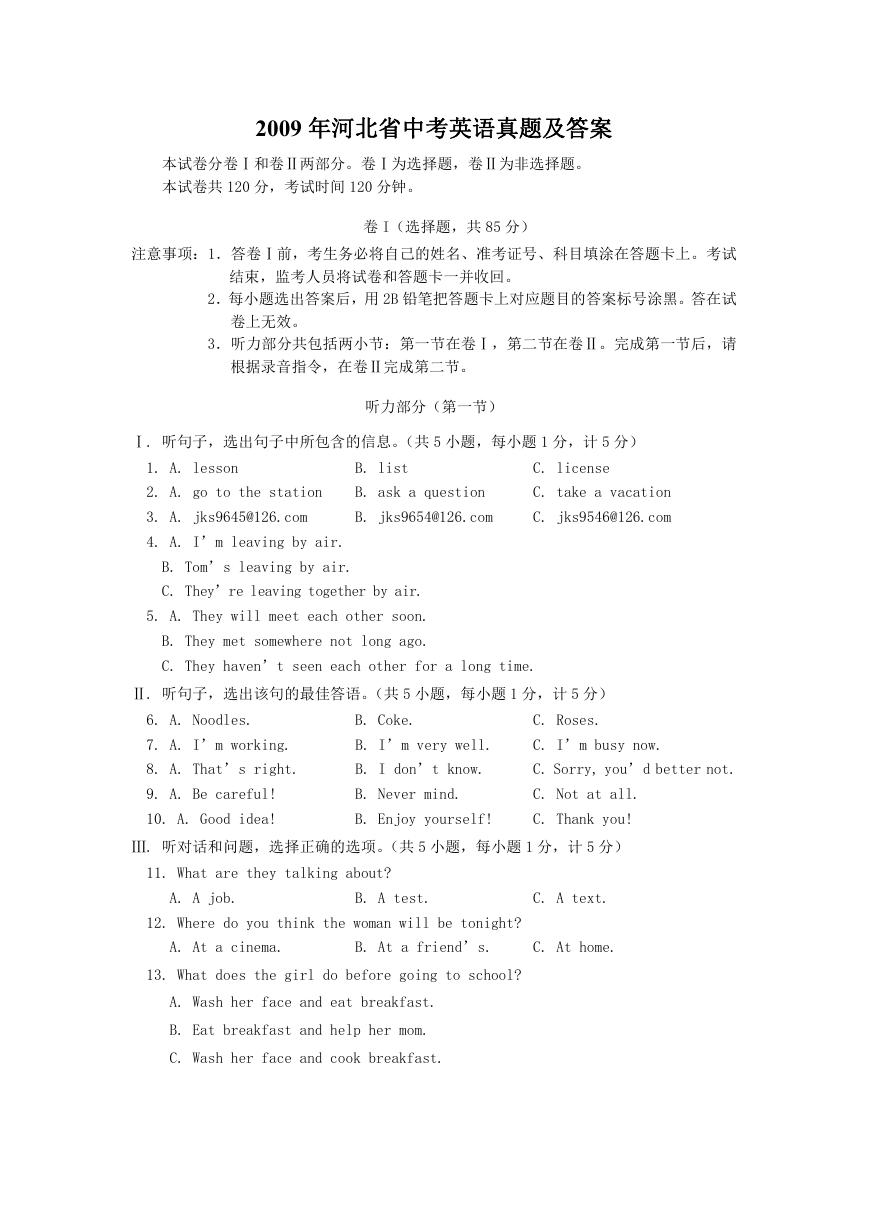
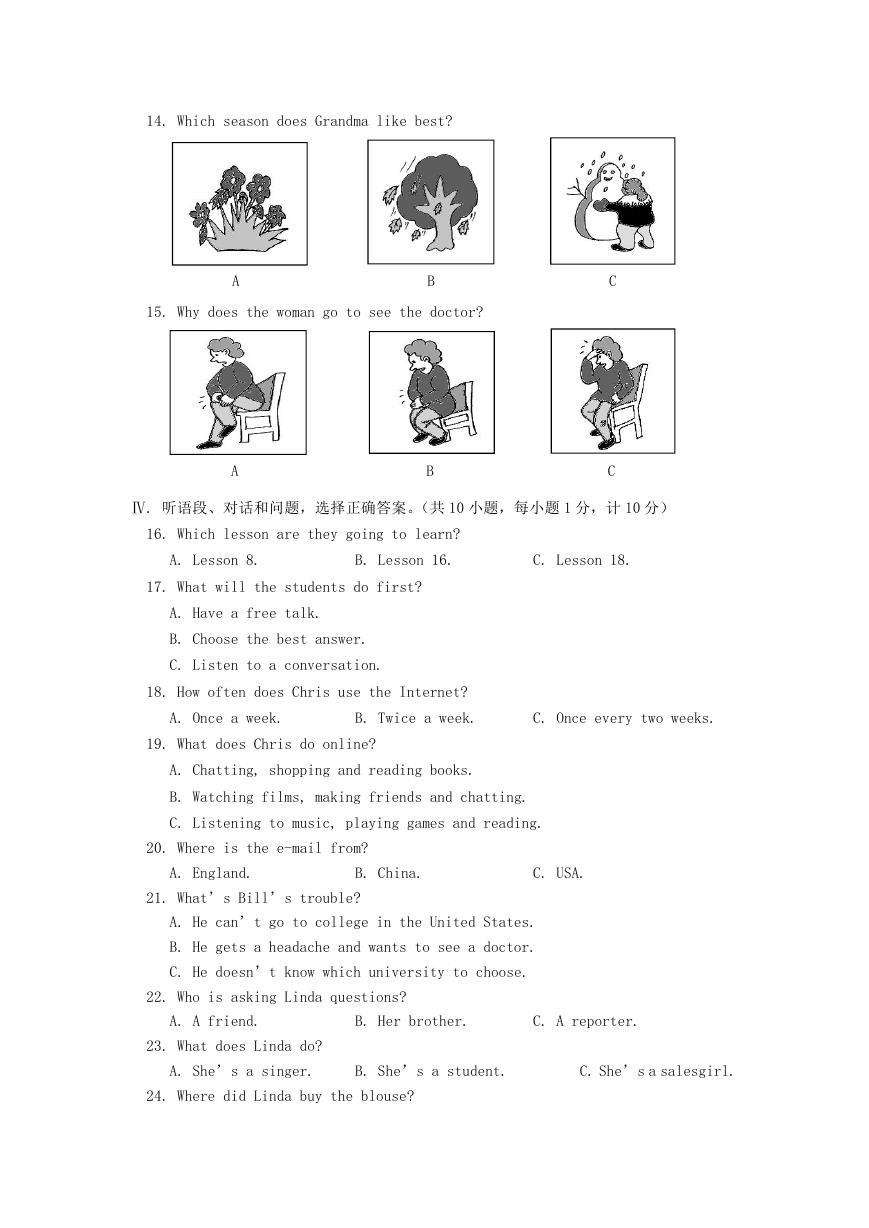
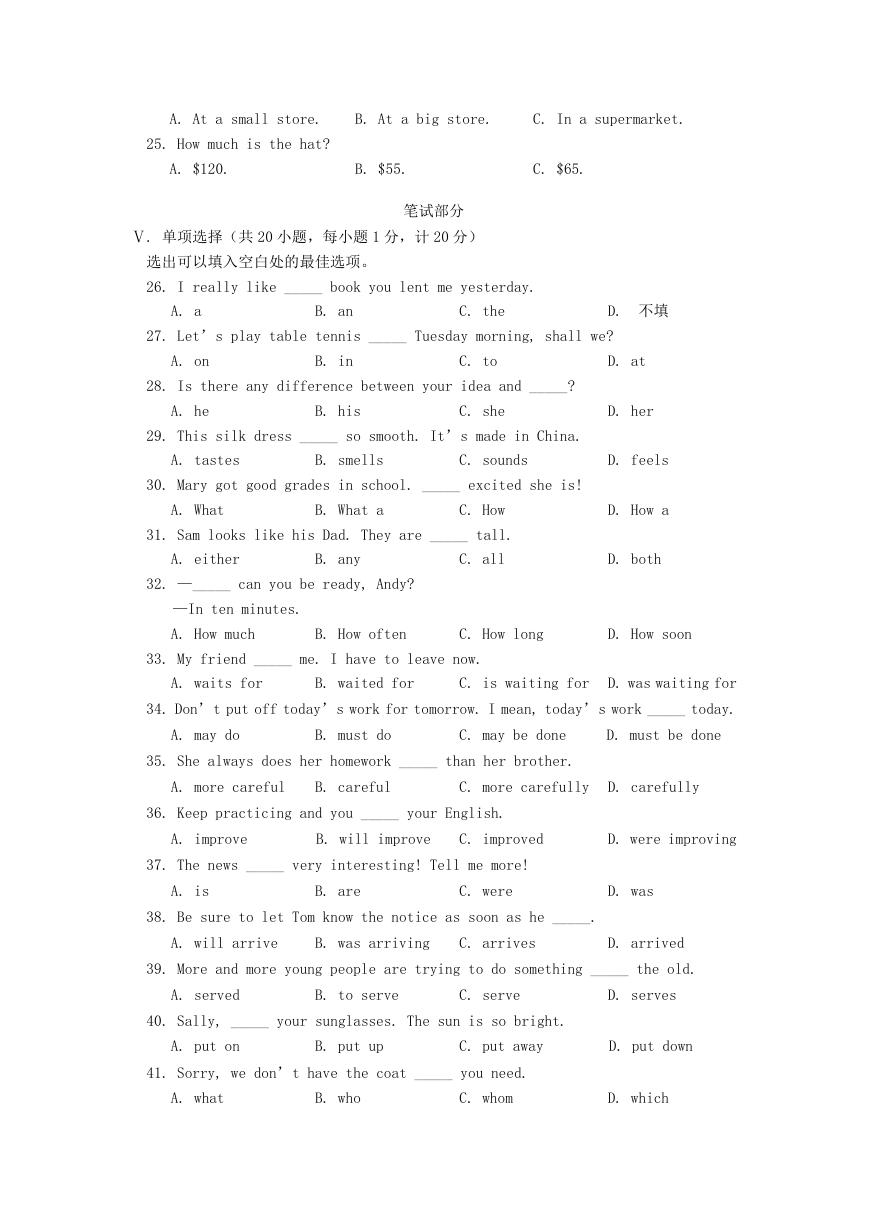
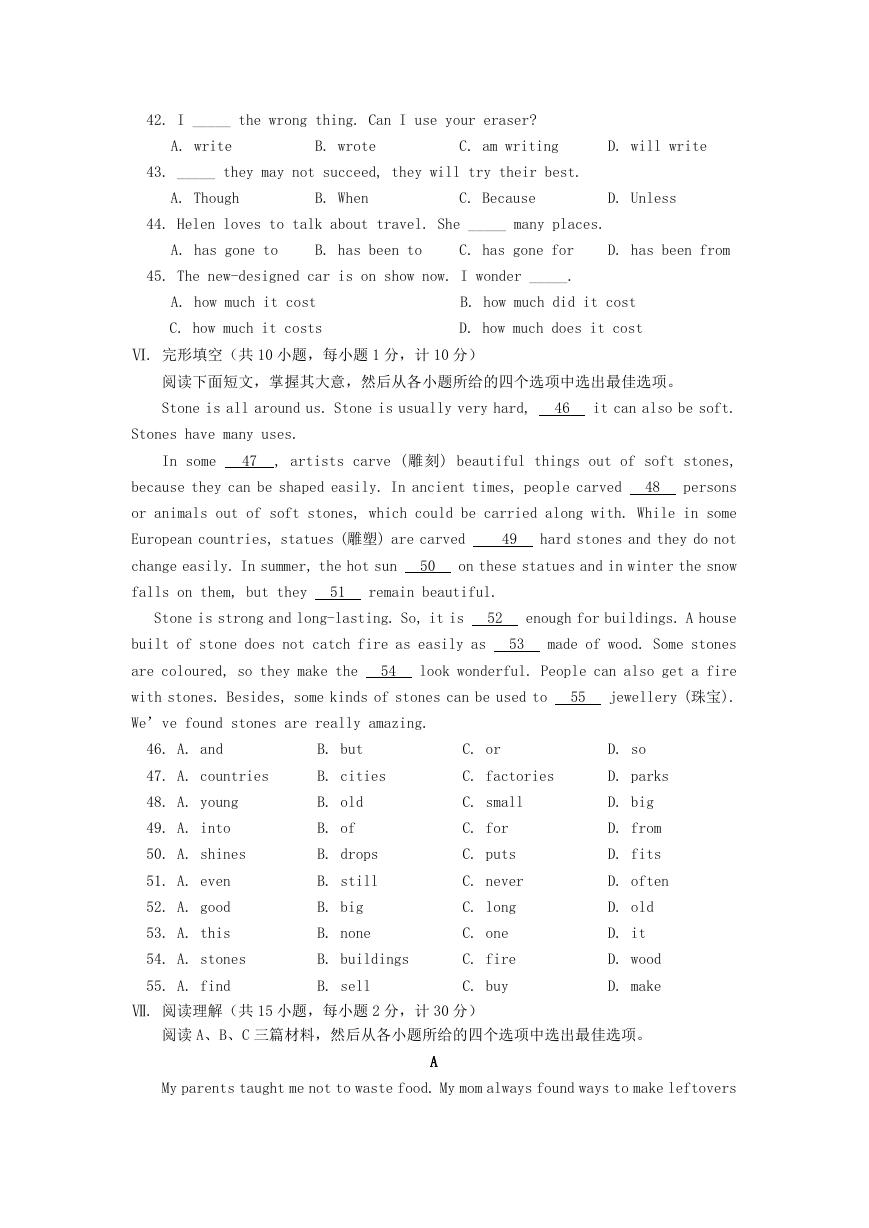

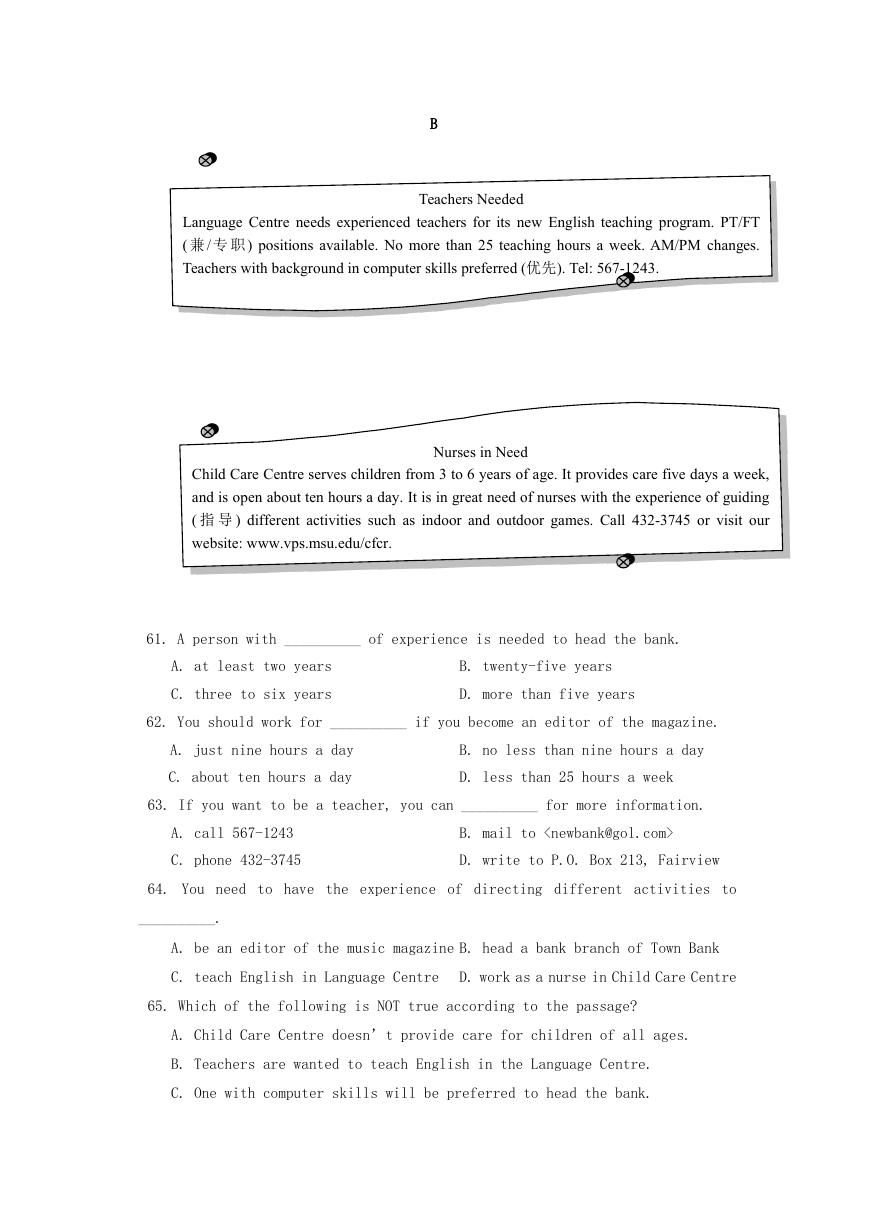

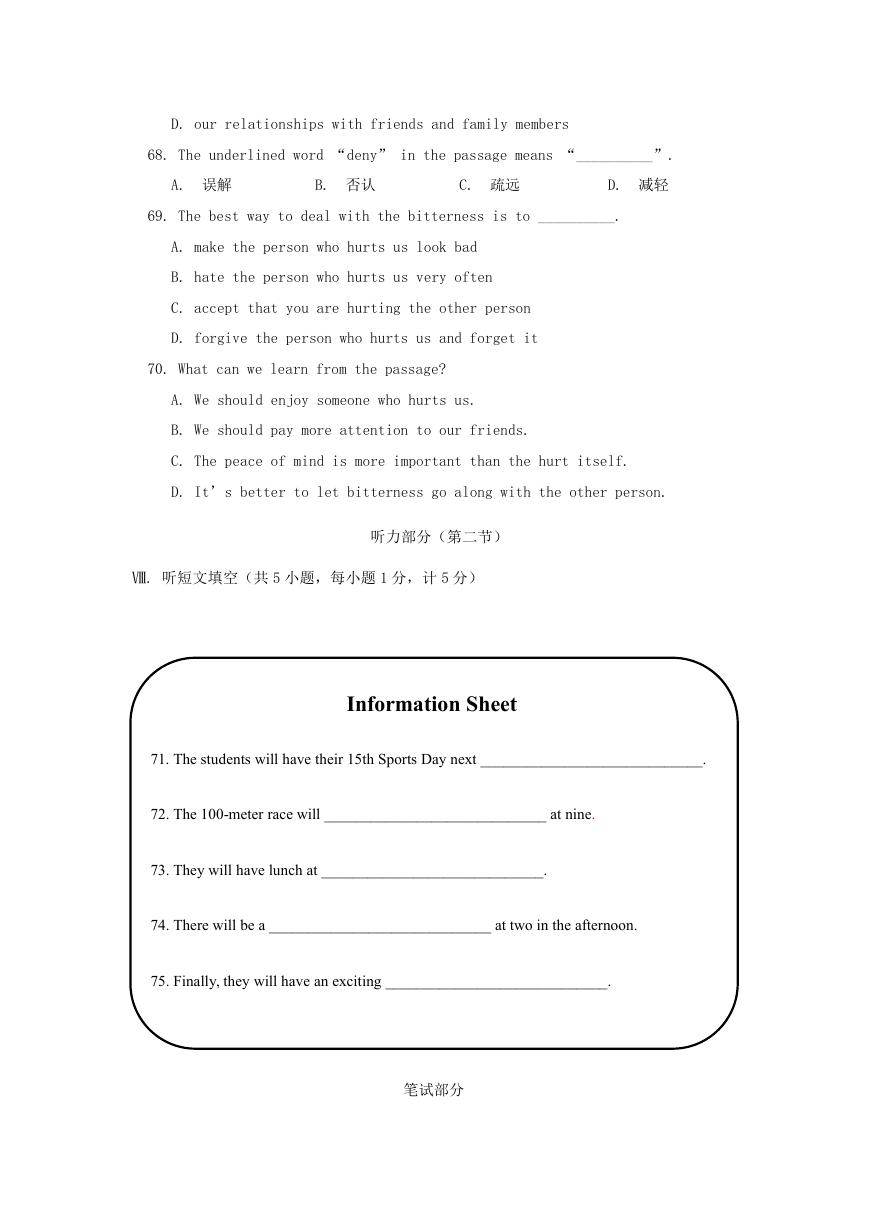








 2023年江西萍乡中考道德与法治真题及答案.doc
2023年江西萍乡中考道德与法治真题及答案.doc 2012年重庆南川中考生物真题及答案.doc
2012年重庆南川中考生物真题及答案.doc 2013年江西师范大学地理学综合及文艺理论基础考研真题.doc
2013年江西师范大学地理学综合及文艺理论基础考研真题.doc 2020年四川甘孜小升初语文真题及答案I卷.doc
2020年四川甘孜小升初语文真题及答案I卷.doc 2020年注册岩土工程师专业基础考试真题及答案.doc
2020年注册岩土工程师专业基础考试真题及答案.doc 2023-2024学年福建省厦门市九年级上学期数学月考试题及答案.doc
2023-2024学年福建省厦门市九年级上学期数学月考试题及答案.doc 2021-2022学年辽宁省沈阳市大东区九年级上学期语文期末试题及答案.doc
2021-2022学年辽宁省沈阳市大东区九年级上学期语文期末试题及答案.doc 2022-2023学年北京东城区初三第一学期物理期末试卷及答案.doc
2022-2023学年北京东城区初三第一学期物理期末试卷及答案.doc 2018上半年江西教师资格初中地理学科知识与教学能力真题及答案.doc
2018上半年江西教师资格初中地理学科知识与教学能力真题及答案.doc 2012年河北国家公务员申论考试真题及答案-省级.doc
2012年河北国家公务员申论考试真题及答案-省级.doc 2020-2021学年江苏省扬州市江都区邵樊片九年级上学期数学第一次质量检测试题及答案.doc
2020-2021学年江苏省扬州市江都区邵樊片九年级上学期数学第一次质量检测试题及答案.doc 2022下半年黑龙江教师资格证中学综合素质真题及答案.doc
2022下半年黑龙江教师资格证中学综合素质真题及答案.doc